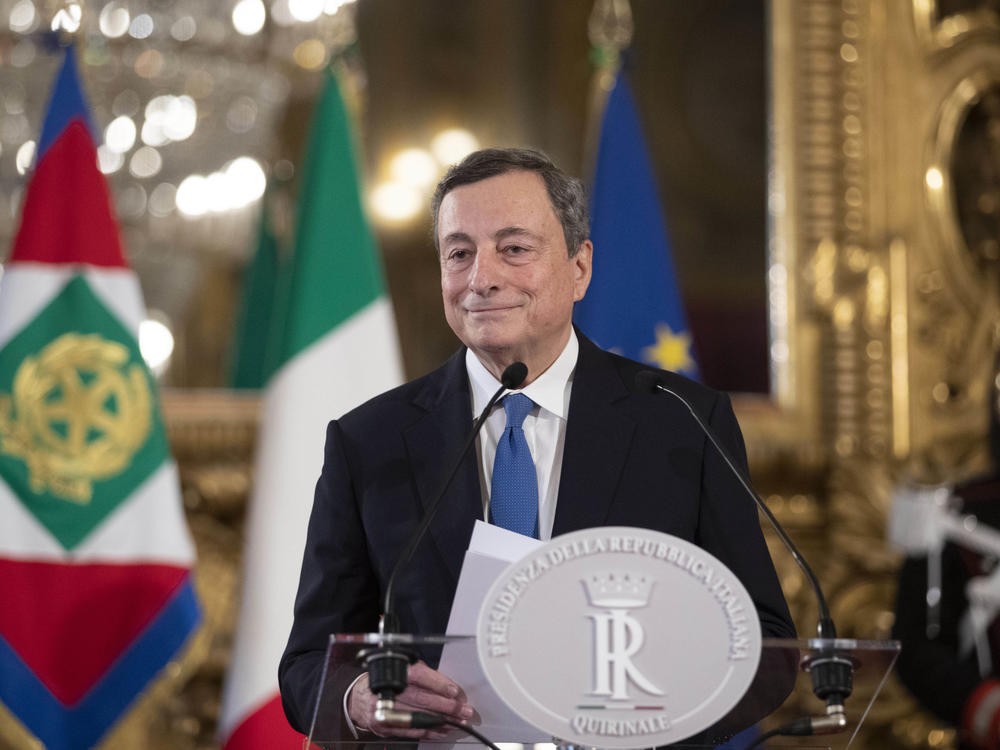Section Branding
Header Content
Mario Draghi, Credited With Saving The Euro, Tapped To Form A New Government In Italy
Primary Content
Amid turmoil from the coronavirus pandemic, the economy, and political infighting, the man known for leading Europe's economy from crisis has been tapped to assemble a new government for Italy.
Mario Draghi, known as "Super Mario" from his time as the president of the European Central Bank, has agreed to form a new government at the request of Italian president Sergio Mattarella. This followed the collapse of the ruling coalition after the resignation of Giuseppe Conte as prime minister last week amid disagreements among its parties over the handling of the pandemic.
If and when Draghi succeeds in putting together a cabinet and wins a parliamentary vote of confidence, then he would become prime minister.
"I thank the president of the republic for the trust he has placed in me," said Draghi in a brief speech after the meeting, as The Guardian reported. "Overcoming the pandemic, completing the vaccination campaign, responding to the needs of citizens and relaunching the country are our challenges. We have extraordinary resources coming from the EU and we can do a lot for the future of the country."
In Italy, the president is a nonpartisan head of state elected by Parliament. The president names the prime minister, who is often the head of a political party.
Draghi became the chief of the ECB in 2011, when Italy was going through a debt crisis. He led the bank for eight years, after previously being Italy's top central banker.
When the eurozone was in turmoil in 2012, Draghi famously said that "the ECB is ready to do whatever it takes to preserve the euro. And believe me, it will be enough." The pledge, and the policies that came with it, served to stabilize Europe's markets and the euro.
Draghi, 73, was born in Rome. As NPR's Sylvia Poggioli has reported, "Among many achievements, Draghi was the architect of Italy's massive privatization program in the '90's, executive director of the World Bank, and managing director for Goldman Sachs International. He got his Ph.D. in economics at MIT."
Italian stocks rose and borrowing rates fell with the news that Draghi had accepted the mandate.
Italy was an early hot spot for the coronavirus, and has seen at least 89,000 deaths from COVID-19 and more than 2.5 million confirmed cases, according to data from Johns Hopkins University. But the country is lagging on the vaccination front, with just 0.65% of the population fully vaccinated. In the U.S., by comparison, 1.8% are fully vaccinated. The New York Times estimated last week that if the rate of vaccination continued at the rate of the previous seven days, it would take Italy nearly five years to vaccinate the whole country.
Lorenzo Castellani, a political expert at Rome's Luiss University, told The Local Italy that a Draghi government would be a technocratic one. "The government programme will be 99 percent occupied by the pandemic and the recovery fund," he said.
Last March, near the beginning of the pandemic, Draghi wrote in the Financial Times that the key question was how governments should put their balance sheets to good use.
"The priority must not only be providing basic income for those who lose their jobs. We must protect people from losing their jobs in the first place. If we do not, we will emerge from this crisis with permanently lower employment and capacity, as families and companies struggle to repair their balance sheets and rebuild net assets," he wrote.
NPR's Sylvia Poggioli contributed to this report.
Copyright 2021 NPR. To see more, visit https://www.npr.org.
Bottom Content

